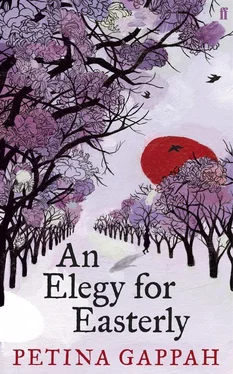We became experts on Indians Mainin ’Juliana was not the only one with an Indian connection; our long-dead Sekuru Simplicious, who was the sibling between our mother and Sekuru Lazarus, had worked with Indians in Durban in South Africa before returning home to Rhodesia and dying in the war.
Indians did not wipe their bottoms with tissues: they washed them with water with their left hand. They worshipped cows. They did not eat meat. When they died, their bodies were burned and not buried. All their food contained curry. They all owned shops; and as shopkeepers, they were all just like Mu India who gave Juliana no Christmas bonus, but instead, gave her leftover pieces of Zambia cloths that no one wanted to buy. The pieces were rarely long enough to wrap around my eleven-year-old waist, and so Juliana gave them to our maternal grandmother who seemed to have a use for every piece of fabric she came across.
Out in Domboshava where my grandmother lived, the pieces of cloth increased my grandmother’s consequence in the eyes of her neighbours. ‘ Akadii zvake Mu India wa Juliana?’ she would ask after his health. ‘And has Juliana given him the herbs that I brought the last time that I was there?’
Mu India waMainin ’Juliana’s indigestion was of particular concern to her because it seemed never to end.
‘Why does he not eat sadza rerukweza? ’ she asked, referring to a mud-brown traditional dish that required a strong stomach to eat.
‘You and your rukweza ,’ said my uncle.
‘It is not meat, so he can eat it.’ And she launched into her usual lecture about the benefits of sadza rerukweza which opened up the intestines and allowed them to breathe.
‘As my brother Simplicious who died in 1974 always said,’ said Sekuru Lazarus, ‘the problem with Indians is that they eat curry too much. Always they say pili pili fakile .’
At the same time that we admired our dead Sekuru Simplicious as a much-travelled man, Danai and I were surprised that the Indian language sounded so close to the little that we knew of Ndebele.

Mainin ’Juliana saw her job as no more than a bridging measure until she landed her dream job. ‘I want to be a top-flight secretary,’ she said to anyone who would listen.
She bought used books with broken spines that proclaimed themselves as having belonged to Tracy Thompson and Debbie Moffat and Squiffy Stevens. In the evenings, she hammered out on a typewriter with a missing m, pressing down on the keys, but with no paper because she could afford neither it nor the typewriter ribbon. She listened to records from the Rapid Results College. There was a single called ‘Spoken English’ that I played for Danai with the gramophone switch in the groove meant for LPs, so that the needle dragged across the record and the voices sounded deeply low and slow, even the woman’s as she said, ‘I want to speak good English.’
‘She wants to speak good English,’ said the man.
‘I speak bad English.’
‘She speaks bad English.’
‘It is very hot in Spain.’
‘She says that it is very hot in Spain.’
Her Rapid Results English proved unnecessary in her job; from what she told us, her real value was in translating Mu India’s shouted orders to his customers to softer, more polite Shona.
Mainin ’Juliana’s top-flight dream seemed close to her in the middle of 1978, the year of the changes. We learned on the news that the government would build more schools and bring electricity to the townships. Danai and I made games out of the cartoon strips in the Herald newspaper and Parade magazine and played being Sam and Ben, characters created by the government to exhort people to vote.
‘Sam,’ Danai would say, ‘if I vote in the April 1979 one man, one vote elections, what will I get?’
In a voice dripping with sincerity, I asked, ‘What have you always wanted, Ben?’
‘Majority Rule!’
‘That is what you will get.’
‘I also want peace; the war to stop.’
‘That is what you will get.’
‘I want the schools to open again; education for my children.’
‘That is what you will get.’
‘I want hospitals and clinics, good care for my family when they are sick.’
‘That is what you will get.’
‘There must be good jobs so we can earn good money.’
‘When you vote that is what you will get.’
Then all together, we said, ‘We must use our vote so that we can get our Majority Rule. We will both vote in the April 1979 one man, one vote elections.’
Sekuru Lazarus had much to say on these elections, as on every other subject. He spoke loudly and at length, kupaumba like my grandmother said, referring to the ceaseless sound that a drum makes in the hands of a particularly enthusiastic drummer, speaking always in a tone of argument even with those who agreed with him.
‘Where were all the schools and the electricity all this time? You tell me that. The suburbs where the whites live are bright and clean, and we have, what? Now that the blacks have said no to their nonsense and taken up arms, do they think they can buy us with their electricity and their schools?
‘We have said no, aiwa, bodo, hwi, nikisi, kwete, haikona, tsvo .
‘They want to cloak our faces with deception. These are bribes to make us forget our suffering so that we vote for their internal settlement.
‘I swear by my grandfather Musekiwa who died in 1959, I swear that even if all the townships in Rhodesia become white with light, I will never vote for Muzorewa.
‘And if this finger on my left had not been cut off in 1965, I would have taken up arms, me.
‘You would have seen me then.’

The new schools that were being built then meant an end to hot-seating, which had meant that we remained at home while others used our classrooms, and then we went to school in the afternoon. Now, we were to go to a new school, one of the three in the township that had been built across the river. A new school meant new uniforms. Mainin ’Juliana said we should come to town to buy our school uniforms from Mu India because she would get a discount.
Mr Vaswani’s shop was at the corner of Bank Street and Manica Road, in the section of the city that was called kuMa India. As we passed by a dusty-looking shop with a dressmaker’s dummy in the window and a dark interior, Juliana said, ‘In there is the tailor who makes suits for the Prime Minister.’
I tried to imagine Prime Minister Smith with his sheep’s eye walking kuMa India to have his suits made. He would have bumped into Africans, the women carrying bundles of shopping on their heads. He would have seen the Indians that we saw, and a few Coloureds, but he would have seen almost no Europeans, his would have been one of the few white faces. If he crossed the road, he would step into the road to Market Square and into a bus that took him to Mbare and from there to the rural areas. And if he continued walking down Manica Road and turned left at Inez Terrace, or walked up Baker Avenue or Gordon Avenue, he would end up in First Street facing the splendour of Barbour’s Department Store and all the other shops like Miltons’ and Thomas Meikle’s where only white people like him did their shopping. Try as I could, I could not see the Prime Minister in this noise and chatter, and I thought, as Sekuru Lazarus sometimes said, ‘Aunt Juliana tends to exaggerate matters.’
Читать дальше













